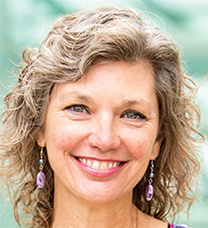Orth a тscientific trailblazerт in the field of bacterial pathogenesis
, a professor at the University of Texas Southwestern Medical Center and investigator for the , has won the 2018 for her outstanding contributions in the fields of biochemistry and molecular biology.
In the field of bacterial pathogenesis, Orth has worked to elucidate the activity of bacterial virulence factors on the molecular level, providing insights into how bacteria cause disease and how eukaryotic host cells signal in response to infection. In his letter nominating Orth, , also a professor at , described her as “an exceptional investigator who has made major contributions to our understanding of the signaling mechanisms involved in bacterial pathogenesis.”

“I am extremely honored and thrilled to receive this prestigious ASBMB–Merck Award. To those that have supported my success, including my family, friends, current and former lab members, and colleagues, and to institutes that have so generously sustained our studies, I am deeply indebted. They have enabled me to investigate tools used by bacterial pathogens, aka, mother nature’s best chemists and biochemists.”
— Kim Orth
Orth’s research originally focused on Yersinia pseudotuberculosis, a bacteria related to the causal agent of the plague. Her work showed that a specific protein secreted by the bacteria is capable of modifying a eukaryotic host protein involved in the innate immune response. This modification promotes survival of the bacteria by blocking inflammation. Her lab also studied a similar protein that can produce the same inflammation-halting effect isolated from Vibrio parahaemolyticus, a bacteria endemic in Southeast Asia and the cause of gastroenteritis. Her findings demonstrated how a bacterial effector protein can act on evolutionarily conserved signal transduction pathways. In his letter, Olson described her work as truly groundbreaking.
Orth has characterized how bacterial effectors manipulate eukaryotic cells through post-translational modifications. She has described how different bacterial proteins can modify host proteins using acetylation, deSUMOylation and deamidation. In one case, she characterized a bacterial effector that acts as an inositol phosphatase to disrupt the host cell actin cytoskeleton connection to the cell membrane, leading to cell death.
While researching post-translational modifications caused by bacterial proteins, Orth discovered a novel activity of the metabolite adenosine monophosphate, or AMP. Her lab showed that proteins can be modified post-translationally with AMP, changing their activity. Orth and colleagues identified a family of bacterial enzymes that are capable of catalyzing this “AMPylation,” highlighting this as an evolutionarily conserved mechanism across pathogens and host cells. Her lab demonstrated that reversible AMPylation is used by host cells to maintain homeostasis. Her research into post-translational modifications has expanded the field of possibilities for regulation of cellular signaling.
Olson described Orth as “one of a diminishing breed of true biochemists able to rigorously dissect complex biological problems in biochemical detail.” Her application of traditional molecular and biochemical techniques to microbial pathogenesis research has yielded important insights. Orth is “an exceptionally talented biochemist, scientific trailblazer and role model for female scientists,” Olson wrote.
Orth earned her Ph.D. in biochemistry and molecular biology at UT Southwestern. She received the 2010 Norman Hackerman Award in Chemical Research from the Welch Foundation and was a 2011 recipient of the Edith and Peter O’Donnell Award in Science from the Texas Academy of Engineering, Science and Technology. She is a member of the American Academy of Microbiology and received the ASBMB 2012 Young Investigator Award.
Orth will receive her award during the 2018 ASBMB Annual Meeting, where she will deliver an award lecture titled “Black spot, black death, black pearl: tales of bacterial effectors.” The presentation will take place at 8 a.m. April 24 in Room 6B in the San Diego Convention Center.
Enjoy reading ASBMB Today?
Become a member to receive the print edition four times a year and the digital edition monthly.
Learn moreGet the latest from ASBMB Today
Enter your email address, and weтll send you a weekly email with recent articles, interviews and more.
Latest in People
People highlights or most popular articles

Meet the 2025 SOC grant awardees
Five science outreach and communication projects received up to $1,000 from ASBMB to promote the understanding of molecular life science.

Unraveling cancerтs spaghetti proteins
MOSAIC scholar Katie Dunleavy investigates how Aurora kinase A shields oncogene c-MYC from degradation, using cutting-edge techniques to uncover new strategies targeting тundruggableт molecules.

How HCMV hijacks host cells т and beyond
Ileana Cristea, an ASBMB Breakthroughs webinar speaker, presented her research on how viruses reprogram cell structure and metabolism to enhance infection and how these mechanisms might link viral infections to cancer and other diseases.

Understanding the lipid link to gene expression in the nucleus
Ray Blind, an ASBMB Breakthroughs speaker, presented his research on how lipids and sugars in the cell nucleus are involved in signaling and gene expression and how these pathways could be targeted to identify therapeutics for diseases like cancer.

In memoriam: William S. Sly
He served on the ТщЖЙДЋУНЩЋЧщЦЌ and ТщЖЙДЋУНЩЋЧщЦЌ Biology Council in 2005 and 2006 and was an ASBMB member for 35 years.

ASBMB committees welcome new members
Members joined these committees: Education and Professional Development, Maximizing Access, Meetings, ТщЖЙДЋУНЩЋЧщЦЌ, Public Affairs Advisory, Science Outreach and Communication, Student Chapters and Women in Biochemistry and ТщЖЙДЋУНЩЋЧщЦЌ Biology.

